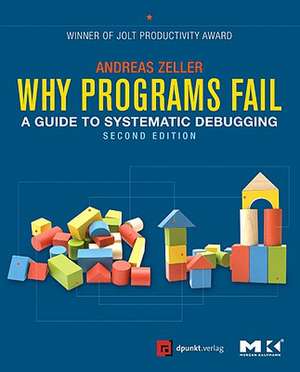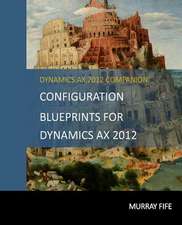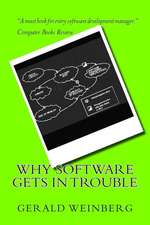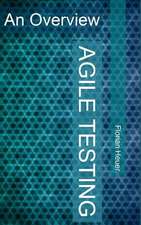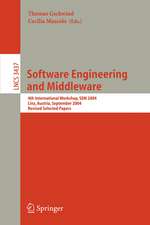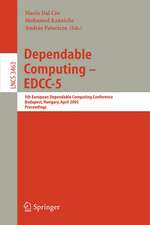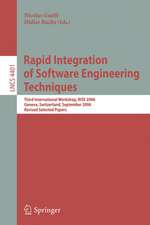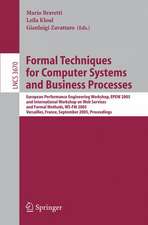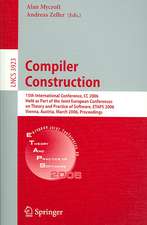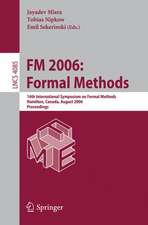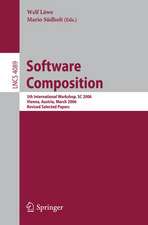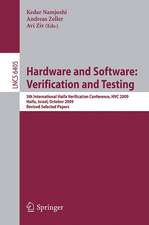Why Programs Fail: A Guide to Systematic Debugging
Autor Andreas Zelleren Limba Engleză Paperback – 22 iul 2009
The fully updated second edition includes 100+ pages of new material, including new chapters on Verifying Code, Predicting Erors, and Preventing Errors. Cutting-edge tools such as FindBUGS and AGITAR are explained, techniques from integrated environments like Jazz.net are highlighted, and all-new demos with ESC/Java and Spec#, Eclipse and Mozilla are included.
This complete and pragmatic overview of debugging is authored by Andreas Zeller, the talented researcher who developed the GNU Data Display Debugger(DDD), a tool that over 250,000 professionals use to visualize the data structures of programs while they are running. Unlike other books on debugging, Zeller's text is product agnostic, appropriate for all programming languages and skill levels.
The book explains best practices ranging from systematically tracking error reports, to observing symptoms, reproducing errors, and correcting defects. It covers a wide range of tools and techniques from hands-on observation to fully automated diagnoses, and also explores the author's innovative techniques for isolating minimal input to reproduce an error and for tracking cause and effect through a program. It even includes instructions on how to create automated debugging tools.
The text includes exercises and extensive references for further study, and a companion website with source code for all examples and additional debugging resources is available.
- The new edition of this award-winning productivity-booster is for any developer who has ever been frustrated by elusive bugs
- Brand new chapters demonstrate cutting-edge debugging techniques and tools, enabling readers to put the latest time-saving developments to work for them
- Learn by doing. New exercises and detailed examples focus on emerging tools, languages and environments, including AGITAR, FindBUGS, Python and Eclipse
Preț: 289.04 lei
Preț vechi: 422.85 lei
-32% Nou
Puncte Express: 434
Preț estimativ în valută:
55.31€ • 57.63$ • 45.79£
55.31€ • 57.63$ • 45.79£
Carte tipărită la comandă
Livrare economică 27 martie-10 aprilie
Livrare express 27 februarie-05 martie pentru 90.53 lei
Preluare comenzi: 021 569.72.76
Specificații
ISBN-13: 9780123745156
ISBN-10: 0123745152
Pagini: 544
Ilustrații: Approx. 200 illustrations
Dimensiuni: 191 x 235 x 22 mm
Greutate: 0.73 kg
Ediția:2 Rev ed.
Editura: ELSEVIER SCIENCE
ISBN-10: 0123745152
Pagini: 544
Ilustrații: Approx. 200 illustrations
Dimensiuni: 191 x 235 x 22 mm
Greutate: 0.73 kg
Ediția:2 Rev ed.
Editura: ELSEVIER SCIENCE
Public țintă
Computer programmers, software developers, analysts and testersCuprins
1. How Failures Come to Be
2. Tracking Problems
3. Making Programs Fail
4. Reproducing Problems
5. Simplifying Problems
6. Scientific Debugging
7. Deducing Errors
8. Observing Facts
9. Tracking Origins
10. Asserting Expectations
11. Detecting Anomalies
12. Causes and Effects
13. Isolating Failure Causes
14. Isolating Cause-Effect Chains
15. Fixing the Defect
Appendix: Formal Definitions
A.1 Delta Debugging
A.2 Memory Graphs
A.3 Cause-Effect Chains
2. Tracking Problems
3. Making Programs Fail
4. Reproducing Problems
5. Simplifying Problems
6. Scientific Debugging
7. Deducing Errors
8. Observing Facts
9. Tracking Origins
10. Asserting Expectations
11. Detecting Anomalies
12. Causes and Effects
13. Isolating Failure Causes
14. Isolating Cause-Effect Chains
15. Fixing the Defect
Appendix: Formal Definitions
A.1 Delta Debugging
A.2 Memory Graphs
A.3 Cause-Effect Chains
Recenzii
Praise from the experts for the first edition:
"In this book, Andreas Zeller does an excellent job introducing useful debugging techniques and tools invented in both academia and industry. The book is easy to read and actually very fun as well. It will not only help you discover a new perspective on debugging, but it will also teach you some fundamental static and dynamic program analysis techniques in plain language." --Miryung Kim, Software Developer, Motorola Korea
"Today every computer program written is also debugged, but debugging is not a widely studied or taught skill. Few books beyond this one present a systematic approach to finding and fixing programming errors." --James Larus, Microsoft Research
"From the author of ODD, the famous data display debugger, now comes the definitive book on debugging. Zeller's book is chock-full with advice, insight, and tools to track down defects in programs, for all levels of experience and any programming language. The book is lucidly written, explaining the principles of every technique without boring the reader with minutiae. And best of all, at the end of each chapter it tells you where to download all those fancy tools. A great book for the software professional as well as the student interested in the frontiers of automated debugging." --Walter F. Tichy, Professor, University Karlsruhe, Germany
"Andreas Zeller's Why Programs Fail lays an excellent foundation far practitioners, educators, and researchers alike. Using a disciplined approach based on the scientific method, Zeller provides deep insights, detailed approaches, and illustrative examples." --David Notkin, Professor Computer Science & Engineering, University of Washington
"In this book, Andreas Zeller does an excellent job introducing useful debugging techniques and tools invented in both academia and industry. The book is easy to read and actually very fun as well. It will not only help you discover a new perspective on debugging, but it will also teach you some fundamental static and dynamic program analysis techniques in plain language." --Miryung Kim, Software Developer, Motorola Korea
"Today every computer program written is also debugged, but debugging is not a widely studied or taught skill. Few books beyond this one present a systematic approach to finding and fixing programming errors." --James Larus, Microsoft Research
"From the author of ODD, the famous data display debugger, now comes the definitive book on debugging. Zeller's book is chock-full with advice, insight, and tools to track down defects in programs, for all levels of experience and any programming language. The book is lucidly written, explaining the principles of every technique without boring the reader with minutiae. And best of all, at the end of each chapter it tells you where to download all those fancy tools. A great book for the software professional as well as the student interested in the frontiers of automated debugging." --Walter F. Tichy, Professor, University Karlsruhe, Germany
"Andreas Zeller's Why Programs Fail lays an excellent foundation far practitioners, educators, and researchers alike. Using a disciplined approach based on the scientific method, Zeller provides deep insights, detailed approaches, and illustrative examples." --David Notkin, Professor Computer Science & Engineering, University of Washington
